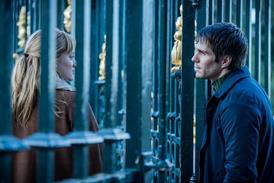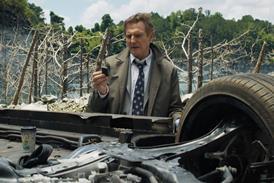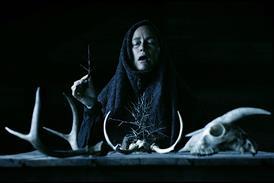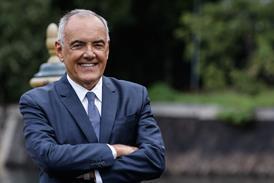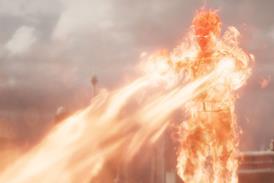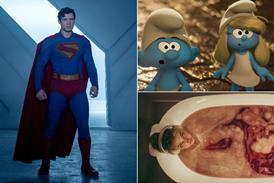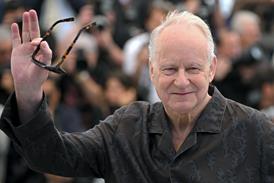Follow up to director’s Fantasia 2024 prizewinner ’Mash Ville’ is overstuffed murder mystery
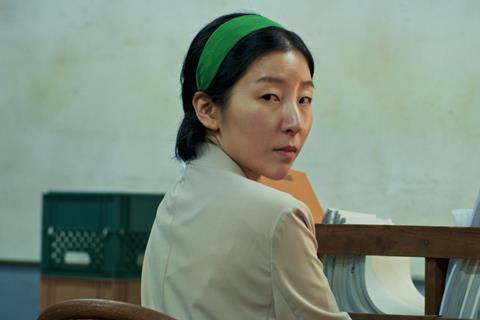
Dir. Hwang Wook. South Korea. 2025. 101mins.
The vacuum cleaner is ready for its close up. After serving as a vessel for the spirit of a recently departed wife in Ratchapoom Boonbunchachoke’s satirical fantasy A Useful Ghost, this humble household appliance now constitutes the link between a frequent job-hopper and a murder suspect in Hwang Wook’s psychological thriller The Woman. Here, it functions as literal and figurative device in an extended opening that delivers a creepy South Korean indie riff on the woman-in-peril scenario. Yet Hwang subsequently loses his storytelling focus, with various clues, conflicts and idiosyncratic character traits being sucked into a narrative void.
A muddled or even noncommittal attitude towards plotting
The Woman receives its world premiere in Fantasia’s Cheval Noir competition, and marks a lightning-quick return for Hwang, who was awarded the section’s 2024 best director prize for his eccentric western Mash Ville. Rather ponderous and infuriatingly inconclusive, The Woman is unlikely to truly get under the skin of attendees and may struggle to snare a distribution deal. Nonetheless, it should enable Hwang to maintain his festival profile through further engagements at Asian and genre-orientated events.
The titular female is Sun-kyung (Han Hye-ji), an unambitious college graduate who has just relocated to a new neighbourhood where she has found a job in a cosy café. After spotting a listing for a second-hand vacuum cleaner on an online swapping platform, Sun-kyung arranges to meet the owner Young-hwan (Kim Hee-sang). She is soon unsettled by his skittish manner, their interactions becoming especially awkward when Young-hwan declines Sun-kyung’s thank you gesture of a box of strawberries on the basis of not accepting gifts from strangers due to tragic family circumstances. Fortunately, Young-hwan’s former classmate Ui-jin (Nam Yeon-woo) happens by and forces a conclusion to the exchange.
Although this intervention seems to eject Young-hwan from Sun-kyung’s life, she receives a call the following day from detective Won Jae Cha (Byun Jin-su) who informs her that Ui-jin has died by suicide. Certain details of her friend’s untimely demise prompt Sun-kyung to consider if Young-hwan may in fact be a murderer. These suspicions are compounded when Young-hwan gets back in touch, ostensibly because he provided the wrong charger for the appliance.
Shot mostly in a pared-down manner by cinematographer Lee Sung-won, The Woman plays initially as a lo-fi genre exercise by establishing Sun-kyung’s humdrum routine and apparent vulnerability. Living alone without much of a social life, she seems to have a distant relationship with her mother and is somewhat naïve when it comes to meeting people through online forums. The scenes in which she first encounters Young-hwan and later pretends to be out when he returns to exchange chargers not only mines the anxiety of interacting with a stranger, but also build to a point of panic without resorting to shock tactics.
In addition to grounding genre tropes in everyday mundanity, this stretch is particularly effective because of the finely pitched performances: Han largely allows her protagonist to be a blank slate on which the audience can project their fears, while Kim exhibits a tightly wound nervousness that makes Young-hwan unsettling yet sympathetic.
Unfortunately, much like Young-hwan’s attempts at social niceties, the narrative soon unravels. After an unnerving opening 40 minutes, Hwang expands the investigation into the possible homicide to take in members of Sun-kyung’s college social circle. This includes the conceited Sung-gu (Nam Jin-bok), an avid contributor to an online crime forum, who happens to work alongside Young-hwan at an athletics club. From this juncture, Hwang tries to upend audience assumptions regarding Sun-kyung while using the tenuously connected set of supporting characters to illustrate how social malaise gives rise to vicious rumour-mongering, with weary public servants like Won Jae Cha trying to limit the fallout. The disquieting music adds an eeriness to Hwang’s navigation of this loose intersection, but his frustrating tendency to pick up and drop different threads makes it difficult to distinguish between actual leads, red herrings and thematic indicators.
Some mysteries are opaque by design. In this case, though, obfuscation stems from a muddled or even noncommittal attitude towards plotting. As such, an abrupt denouement that aims to put a sting in the tail is instead likely to cause severe head-scratching.
Production company: Kitschs Production
Contact: Kitschs Production, kitschs86@naver.com
Producers: Lim Dong-min, Byun Jin-su
Screenplay: Lim Dong-min, Hwang Wook
Cinematography: Lee Sung-won
Production design: Hwang Wook
Editing: Hwang Wook
Main cast: Han Hye-ji, Byun Jin-su, Kim Hee-sang, Nam Jin-bok, Nam Yeon-woo





